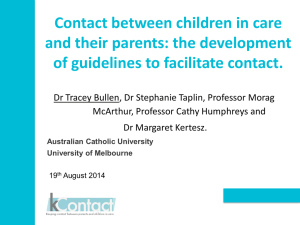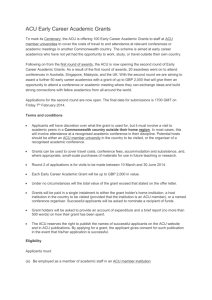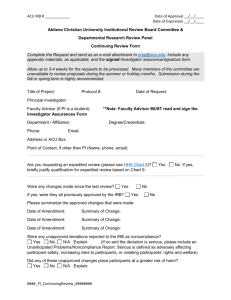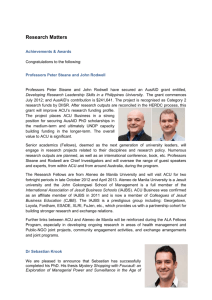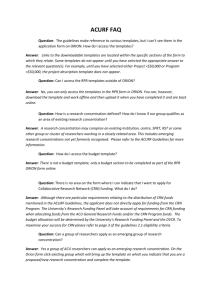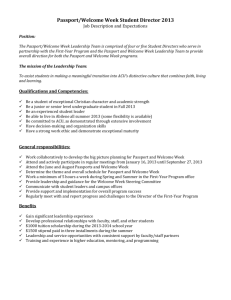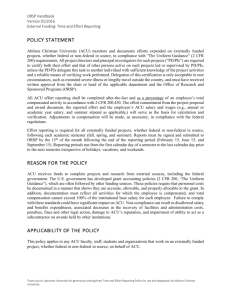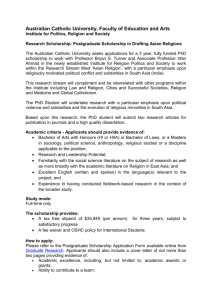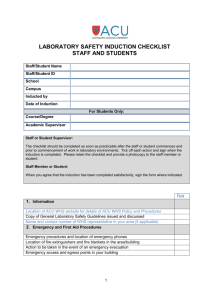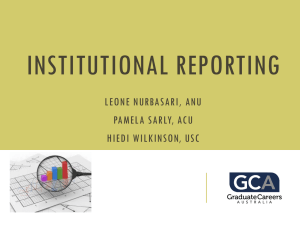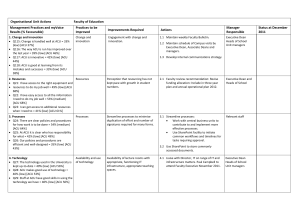Collaboration on research projects involving external parties and
advertisement
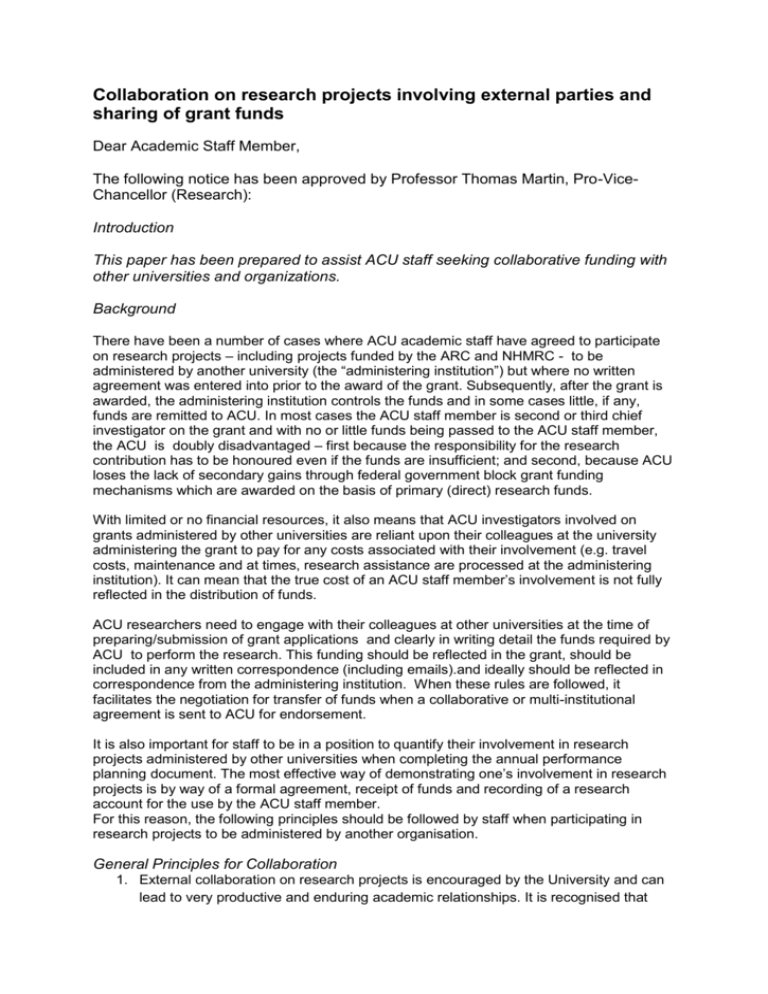
Collaboration on research projects involving external parties and sharing of grant funds Dear Academic Staff Member, The following notice has been approved by Professor Thomas Martin, Pro-ViceChancellor (Research): Introduction This paper has been prepared to assist ACU staff seeking collaborative funding with other universities and organizations. Background There have been a number of cases where ACU academic staff have agreed to participate on research projects – including projects funded by the ARC and NHMRC - to be administered by another university (the “administering institution”) but where no written agreement was entered into prior to the award of the grant. Subsequently, after the grant is awarded, the administering institution controls the funds and in some cases little, if any, funds are remitted to ACU. In most cases the ACU staff member is second or third chief investigator on the grant and with no or little funds being passed to the ACU staff member, the ACU is doubly disadvantaged – first because the responsibility for the research contribution has to be honoured even if the funds are insufficient; and second, because ACU loses the lack of secondary gains through federal government block grant funding mechanisms which are awarded on the basis of primary (direct) research funds. With limited or no financial resources, it also means that ACU investigators involved on grants administered by other universities are reliant upon their colleagues at the university administering the grant to pay for any costs associated with their involvement (e.g. travel costs, maintenance and at times, research assistance are processed at the administering institution). It can mean that the true cost of an ACU staff member’s involvement is not fully reflected in the distribution of funds. ACU researchers need to engage with their colleagues at other universities at the time of preparing/submission of grant applications and clearly in writing detail the funds required by ACU to perform the research. This funding should be reflected in the grant, should be included in any written correspondence (including emails).and ideally should be reflected in correspondence from the administering institution. When these rules are followed, it facilitates the negotiation for transfer of funds when a collaborative or multi-institutional agreement is sent to ACU for endorsement. It is also important for staff to be in a position to quantify their involvement in research projects administered by other universities when completing the annual performance planning document. The most effective way of demonstrating one’s involvement in research projects is by way of a formal agreement, receipt of funds and recording of a research account for the use by the ACU staff member. For this reason, the following principles should be followed by staff when participating in research projects to be administered by another organisation. General Principles for Collaboration 1. External collaboration on research projects is encouraged by the University and can lead to very productive and enduring academic relationships. It is recognised that research collaboration is multi-faceted and the receipt of grant funds is only one component of collaborating with one’s peers. 2. At the time of agreeing to participate on a research project to be administered through another university/organisation, the ACU researcher must ensure that their intellectual input and time commitment is recognised in the application or in email or hard copy correspondence with the lead investigator; 3. In addition to recognition of time and intellectual input, the ACU researcher must ensure that they have costed fully their budget needs and ensured that any costs related to their involvement (maintenance, equipment, travel, salaries for research assistance) are attributed to ACU by remittance of funds to the University. To avoid any uncertainty and disagreement once the project is awarded, the most effective method is to obtain agreement from the lead investigator at the administering university on the amount to be remitted to ACU prior to submission of the grant proposal; 4. Collaborative or multi-institutional agreements are the most common form of agreement governing the transfer of funds to one or more partner universities/organisations involved on a project. For grants awarded by the Australian Research Council and the National Health and Medical Research Council, most universities use pro-forma agreements that have a number of common elements familiar to most grant administration offices/contract solicitors. If an ACU researcher is sent an agreement to sign, it must first be sent to the Grants Unit (OPVCR) for checking. These agreements can only be executed by an authorised officer of the University and for research agreements, this is the Pro-Vice-Chancellor (Research). 5. Staff should consult with their Head, Dean or Associate Dean of Research when considering involvement on research projects administered by another university to discuss resource implications and the impact on workload. The research grant coversheet has been developed for all research applications and funds to be administered by ACU but can also be used for involvement on research projects where ACU is not the primary administering institution (URL: http://www.acu.edu.au/about_acu/research/for_researchers/applying_for_research_g rants/) Enquiries: Dr Lihong Kong Lihong.Kong@acu.edu.au Extension: 2105 Faculties of Arts and Sciences, Health Sciences, Business (from January 2010) and Theology and Philosophy. Excluding the Faculty of Education and academic organisational units at Brisbane campus. Rowena Olding Rowena.Olding@acu.edu.au Extension: 7349 Faculty of Education (all ACU locations) and all Brisbane campus Faculties. (Monday, Wednesday, Friday) Jim Holt James.Holt@acu.edu.au Extension: 7591 Review of grant proposals, policy, oversight of grants unit. (Monday to Thursday)
